Address
SACKOBA HQ,
St. Anthony’s College,
Kandy, Sri Lanka 20000
Email Address
secretary@sackoba.lk
editor@sackoba.lk
Address
SACKOBA HQ,
St. Anthony’s College,
Kandy, Sri Lanka 20000
Email Address
secretary@sackoba.lk
editor@sackoba.lk
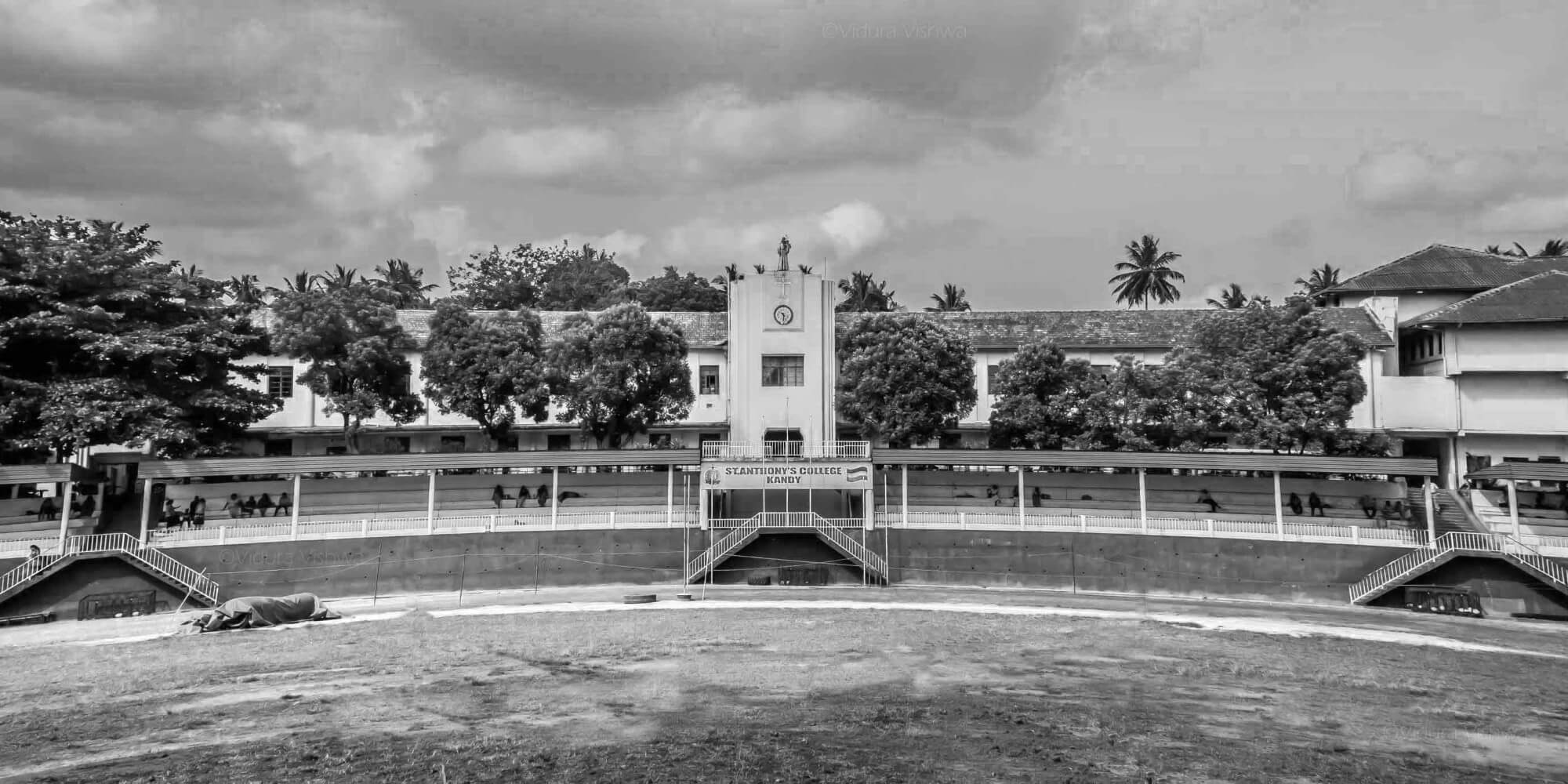
With grateful appreciation to Tilak Pananwela.
The title I originally chose for this article was Two Days in March when I realised that a few years ago, there was a movie with a name that was almost similar – I think it was Two Days in May. So Glory Days it is. Those who witnessed the cricket encounter between St Anthony’s and St Joseph’s in March 1960 would have seen a cricketing duel in the sun – a game which lifted one to the heights of euphoria and depths of despair, depending on which college was graced by your loyalty. Both sides had a formidable batting line-up and much was expected from the capacity crowd present at Darley Road. But in complete contrast to crowd expectations, it was a low-scoring game, but nail biting, nerve tingling, stomach churning and tension filled to the very last ball. Even today, discussions on this game will send one into spasms of excitement, volatile debate, and at worst be the subject of one’s worst nightmare, depending on which college you supported.
I am very grateful to Tilak Pananwela for sending me the details of this match, in a letter he sent me soon after star batsman and Antonian captain Charlie Joseph had passed away. Tilak was a member of that unbeaten side and having played in this game experienced all its drama and fluctuating fortunes. So it is time for me to step aside and let him tell the story, but not before reminding the reader that Tilak too was a sportsman of no mean repute, having represented college at cricket and soccer. He was superb fielder and a good batsman, and in soccer he excelled at right half. Of impeccable character, Tilak always played the game in true spirit just like his skipper. At St Anthony’s, I was with Tilak from “The Rainbow Cottage” right up to “The Journey’s End”. He is an Antonian of whom the college can be justly proud. These are Tilak’s recollections of that match:
“The game against St Joseph’s in March 1960 at Darley Road was one of the tensest games I ever played. It was the last game away, before the “big match” against Trinity. Besides, the two main contenders for the Schoolboy Cricketer of the Year award Charlie Joseph and Tissa De Soyza, were playing in the opposing teams.
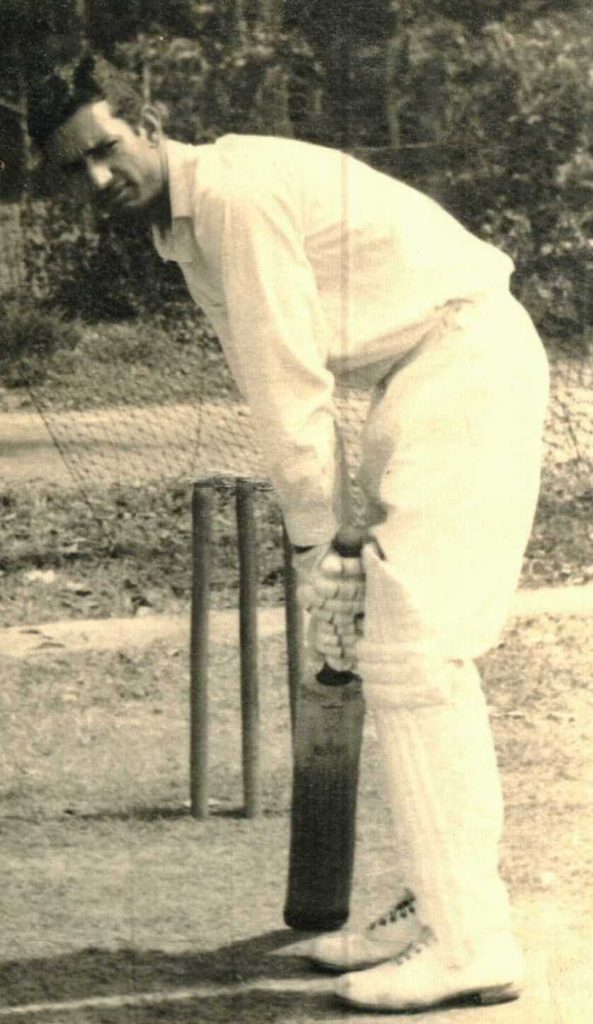
We won the toss and batted first, but collapsed for the paltry total of 134. Out of this low score, Charlie scored a technically perfect 73 and was the only batsman who held sway against the spin duo of Raja De Silva and the Josephian captain Priya Perera. He lost his wicket by swinging out due to lack of partners and hit the ball high and hard to fine leg where he got out to a brilliant catch. Had the fielder missed, it was a sure six and another century was on the horizon. The Josephians fared no better and were all out for 135. But our second innings was a disaster – we were bundled out for 88. The Josephians had to get 87 to win in about 90 minutes to clinch victory, and they walked out to bat brimming with confidence.
They sailed along in full control and at one stage were 50 for 1 belting our bowling all over. It was then that Charlie switched me to silly-mid-off in order to exert maximum pressure on the batsmen. It was a move that was favoured by fortune. Until then, Hillary Marcelline was in good form. Three balls after I was moved to silly-mid-off, Marcelline suddenly lashed out and I instinctively stretched my hand out and caught the ball on the rebound. The departure of Marcelline triggered a collapse and soon they were 80 for 9 wickets with just two overs remaining. By this time there were unprecedented crowds which resulted in severe traffic jams on Darley Road. But the last pair held on valiantly, and the excitement and tension were so great that some old Josephians were seen praying in the nearby chapel.
But the last pair held on valiantly, and the excitement and tension was so great that some old Josephians were seen praying in the nearby chapel.
Cricket was King because the match was played by both teams in the true spirit of the game. And sweet delight, we maintained our unbeaten record, and Charlie secured first place in the batting averages. Eventually, he was elected Schoolboy Cricketer of the Year (1960) for the second time, the first being in 1959.
Tilak ends his recollections of that day with the humorous mood which prevailed at day’s end after the dust had settled. He wrote:
Brother Columban Macky (and the old boys present) was so excited he delayed the team’s departure to Kandy the next day and organised a lunch at an old boy’s estate in Avissawella. How he did this before the mobile phone was invented is an amazing feat.
Tilak ends his recollections of that day
In the same year, 1960, Charlie Joseph true to form delighted the spectators with a dazzling century in the Trinity-Antonian big match encounter of 1960 played on the college grounds. However, there is one lesser known fact to this century by Charlie which few knew, and fewer will remember after the passage of 55 years. To set the scene, I have to part the veil of time and go back to the year 1960 when I was in “The Journey’s End” – the final stopover in the life of a boarder, before leaving the warm nurturing embrace of St Anthony’s, to venture forth into the wide world to follow your destiny. This was an era when Lux De Coelo shone its radiant rays on that Shangri-La of an educational institution which was St Anthony’s College, Kandy. Apart from Charlie, the other cricketers in that elite group of seniors were Michael Joseph and Tilak Pananwela. Conversely, in my class the Form 5 Arts “A”, the cricketers were Franco Burke, Muthaliph, Michael Landsberger, Charlie Joseph and to a lesser extent, Tilak Thalakada. I used the words “lesser extent” because Tilak was in the Sinhalese medium, but for some unfathomable reason used to come to the 5 Arts “A” to follow the Sinhalese class under Mr. B.L.Fernando. Because we met him from Monday to Friday he qualified to become a classmate.
On Friday morning, the first day of the match, Charlie awoke with a temperature. I remember he went to the sickroom where the matron-in-charge, Mrs Paige, gave him some medication and cautioned maximum rest if he hoped to play that afternoon.
In class, as the minutes ticked by, we heard that it was doubtful if he would take the field, and this caused much consternation. By the time the tea interval came around at 10.15am the rumour had reverberated through the hallowed corridors that he would not play. To paraphrase the bard of Avon, the catchcry was “To play or not to play – that is the question”. But just before classes ended at 12.15pm Antonians heaved a collective sigh of relief when word got around that the “skipper” would take the field. A dark cloud had lifted and all of a sudden the world seemed a better place.
I stood under the cherry blossom tree in front of the Bursar with a few classmates and Journey’s Enders waiting for play to begin. College won the toss and when Charlie walked to the crease, the applause and jubilant cries that greeted him was akin to the roar of the crowds in the Roman Colosseum, over 2000 years ago. That sounds fanciful, but sometimes time travel helps to fire one’s imagination!
I learned later in the day that he had a temperature when he went in to bat, and sallying forth in the blazing sun must have taxed his stamina to the maximum. And true to form he did not disappoint the large crowd present, reaching his century shortly after tea. He lost his wicket at 123, swinging wildly and having missed was clean bowled.
What I know about cricket could be written on the head of a pin, but my humble opinion is that the shot he played was more out of fatigue than lack of concentration.
As he walked back to the pavilion, I noticed the look of utter exhaustion on his face. Taking the field in tropical heat while running a temperature, then staying the distance and scoring a century was a class act. Charlie once again lived up to his reputation. His resilience and inner strength bound by a will of steel stayed strong.
The other highlights of this encounter were the century scored by the Trinity captain Jayantissa Ratwatte the next day, and the classic quick-fire knock of 157 for no loss by the Antonian openers Tilak Thalakada and Muthaliph in the second innings. The game ended in a draw.
I wish to conclude citing another incident cementing Charlie’s reputation. During the second term, the authorities of Walalla Central College, Katugastota, hired the college grounds to hold their sports meet.
When the meet was in progress, two strangers were observed walking about in the vicinity of the Villa and the old music room on the road behind the physics laboratory leading to the refectory. A prefect was notified and he went up to these strangers and asked them what they wanted and if he could be of assistance. They replied that they were students of Walalla Central College, and had come hoping to see Charlie Joseph.
Among my papers, I treasure a card from an old Josephian who sent it to me when he heard of Charlie’s untimely passing. He wrote: “Rarely has a sports champion captured the affection of his friends to the extent that Charlie has.”
Rarely has a sports champion captured the affection of his friends to the extent that Charlie has.
An old Josephian who sent it to me when he heard of Charlie’s untimely passing
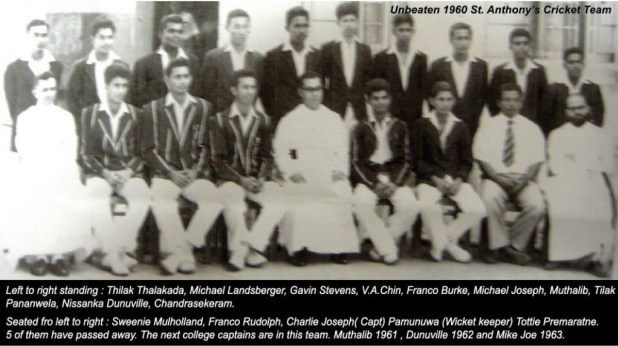
I wish to conclude with the following footnotes:
Finally, I think it fitting to conclude with a tribute to Charlie by way of “Charlie’s Corner”. I am very grateful to Franklyn Amerasinghe for having on record Charlie’s sensational batting performances, and for sending these to me. The record speaks for itself:
1959: Charlie scored centuries against St Benedict’s, St Peter’s, Kingswood and Nalanda. In the “Big Match” against Trinity he was unbeaten on 95 due to lack of partners.
1960: Charlie scored centuries against St Benedict’s, Nalanda and Trinity. (He was out for 73 in the match against St Joseph’s).
1961: He scored centuries against Kingswood and Dharmaraja. The rest of the fixtures that year were cancelled after the match against Royal, due to the prevailing situation arising out of the proposed schools take-over.
Charlie’ record: 9 centuries in three seasons. In essence, two seasons and three matches due to the cancellation of the other matches in 1961.
As the years pass, the memories grow fonder, the songs sound sweeter, and nostalgia, with all its nuances of reminiscing and yearning deeper and intense. We bask in the sunshine of those golden years bound by our love for what was easily one of the best, if not THE best educational institution in the island. And, as twilight brings the curtain down, there is often a lonely heartache, sometimes a silent tear. But always a loving memory of the college we loved so dear.
Precious memories, how they linger.
I had the privilege of playing with him in 1961, which was my first year in the team and he was an absolute colossus – when he strode to the wicket everyone settled into their seats expecting the grounds to light up. He was so calm and sedate as he went about his business of dispatching the ball to all parts, especially the covers. One of my friends who played for a rival school said that he dreaded to be in the covers when Charlie was batting. In 1961 he scored two centuries one against Dharmaraja which my friend Bernard has written about. Kehelgamauwa was at his most venomous best but Charlie and his brother Michael handled him as if he was just an ordinary bowler to be treated on his merits. They both got centuries. Charlie was suffering from eye strain and played in dark shades and I marveled at his ability to tackle Kehel’s thunderbolts when we lesser mortals with normal sight were falling like nine pins!!
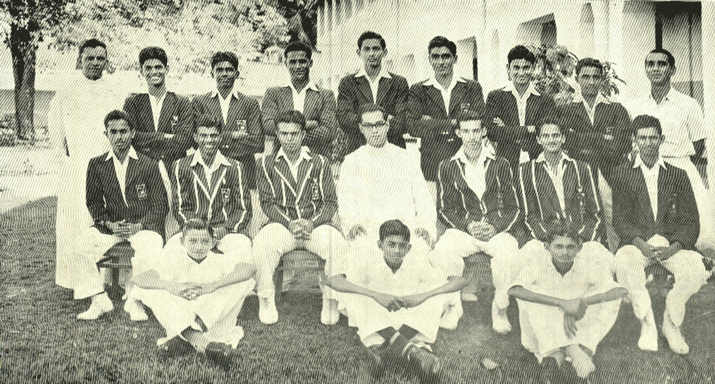
The above is the Team of 1958 Charlie is seated on the right extreme facing us and next to him is Ranjit Samarasekera and on his right is Steven Joseph, Charlie’s eldest brother.
In 1959 Charlie played 12 innings scoring 717 runs at an average of 102.42. His scores included 101 against Kingswood, 45 not out against Nalanda, 123 against St. Benedict’s, 86 against Ananda, 101 against Dharmaraja, 115 not out against St. Peter’s and 95 not out against Trinity. What was most amazing was that he also headed the bowling averages with 23 wickets at an average of 13.7.
In 1960 he scored centuries against St. Benedict’s, Nalanda and Trinity. In 1961 he had centuries against Kingswood and Dharmaraja.
He was Head Prefect of the school and was an all-round sportsman excelling in other sports such as athletics, rugby and soccer as well. He was a complete gentleman, always pleasant and courteous – a marvellous role model to all of us.
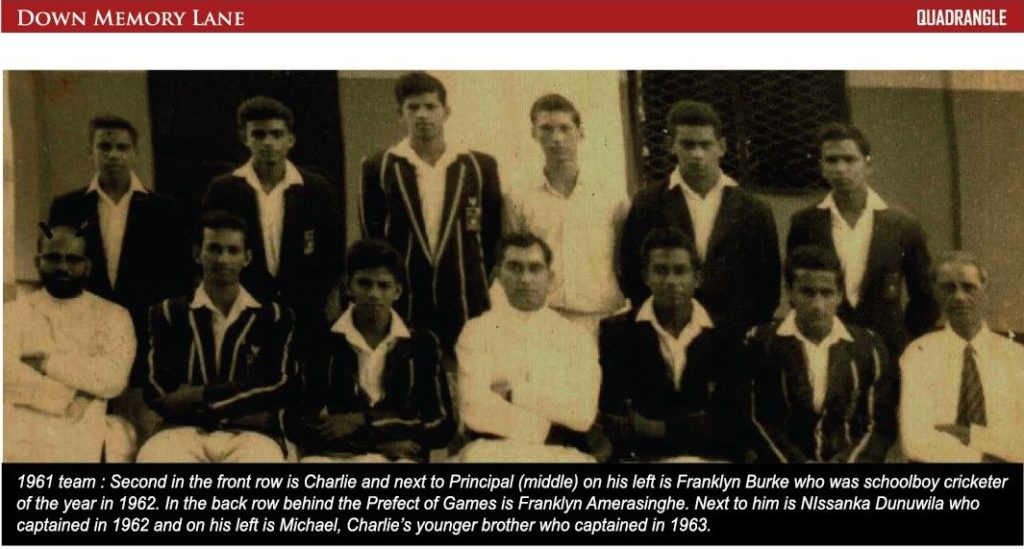
This is the 1961 Team. The second in the front row is Charlie and next to Father Principal on his left is Franklyn Burke who was schoolboy cricketer of the year in 1962. In the back row behind the Prefect of Games is me. Next to me is Nissanka Dunuwila who captained in 1962 and on his left is Michael, Charlie’s younger brother who captained in 1963.